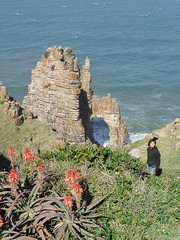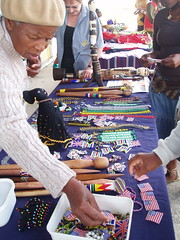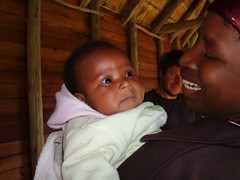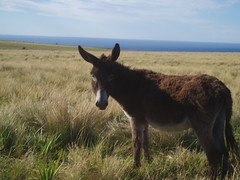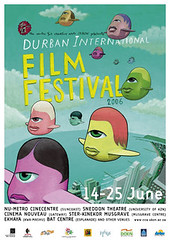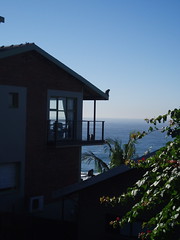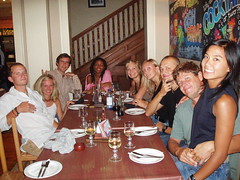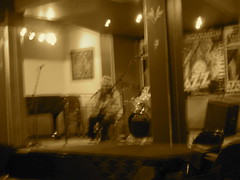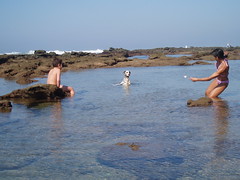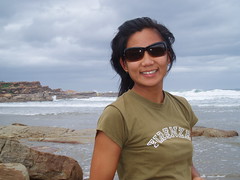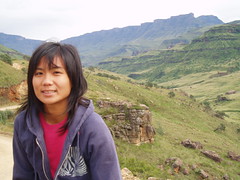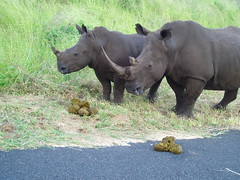"Small Things Count": a resource to those who approach their existence as a contribution to the world and how they live to making these initiatives happen in small or big ways.
Friday, July 07, 2006
Adherence to Antiretrovirals (ARVs)
Yesterday was an article, "New AIDS Pill to Treat People in Poor Countries" in the New York Times which refers to the FDA approval for a new 3-in-1 antiretroviral (ARV) pill which can be taken by HIV/AIDS patients. It is produced by an Indian generic drug company and this approval means that the US, the largest distributor of ARVs can start releasing this drug to the rest of the world in their USAID programmes. Currently the WHO has approved another 3-in-1 ARV pill and it is being used by around 400,000 patients. Why is this important for the patient? After completing this course on HIV/AIDs in Southern Africa, I learned that a major barrier for the success of ARV treatment is whether patients are willing to adhere to the requirements necessary. In countries where HIV+ are discriminated by major stigma is placed on families and friends, and poverty is prevalent, adherence can be hindered. Even simple this like finding transportation to your medical appointment, taking time off work, hiding one's status and the drugs from the family, etc. can be major dilemna. Having the chance to take only one pill twice a day can alleviate a few of the difficulties in adherence. It seems that adherence becomes a collaborated effort by medical staff, the individual, family and community to support the patient. These social actors can truly assist in successful treatment and healthy lives.
Wednesday, July 05, 2006
back in class. Political Economy
Def: "social laws of protection and distribution". It's great yet tiring to be back in class. I'm in this intensive 3 days a week, 3 week course called Political Economy in the Welfare State taught by Charles Meth. Today, we are reviewing theoretical aspects of the welfare state: objectives such as efficiency, reducing inequality, social integration and administrative feasibility (book by Nicholas Barr). Also reviewing ideologies of libertarian, liberal and socialist theories. Interesting quote from the instructor of capitalism - "goals of creative destruction". thought to ponder. Socialism looks at trying to ameliorate the worst effects of capitalism. According to socialism, capitalism is this inevitable place that causes inequality as it exploits modes of production for goods to sell. Someone will get the short end of the stick unfortunately, but how can one make this as least inequal as possible.
I've got two papers to write: first is on the "spirit of ubuntu" or the South African ideal of solidarity and the second paper on evidence-based policy formation... apparently there is little information on either topics so YEA! I guess I should probably start researching now. Let me know if you have any leads.
I've got two papers to write: first is on the "spirit of ubuntu" or the South African ideal of solidarity and the second paper on evidence-based policy formation... apparently there is little information on either topics so YEA! I guess I should probably start researching now. Let me know if you have any leads.
Tuesday, July 04, 2006
Mr. Price Pro

So I found out that this week, Durban hosts the 6 star WQS surfing competition called Mr. Price Pro. Big names like Occy, Sunny Garcia, Andy Irons and my fav, Kalani Robb are strolling the beachfront of North Beach... crazy. I'll be sure to head down and see what kind of festival this is really all about. In the meanwhile, here is a shot of yesterday's offshore from Garvies... crowded lineup by 10:30am.
Cathedral Rock at Waterfall Bluff
I'm back within distance of communication via cell phone and internet after being in the Transkei for one week. I have been helping out with my friend's PhD project monitoring predator marine activity during the annual South African coast sardine run. This sardine run is quite famous as filmmakers from National Geographic and BBC come down to try to capture this phenomenon of bait balls (sardines circling in a tight ball formation) and the sharks, whales, dolphins, gannets and other predatory fish follow them along the coast. Apparently this year's sardine run was a flop because of the consecutive fronts that hit the coast the last two weeks of the run. Unfortunate times for filmers but could be useful information for researchers like Sean. Basically I was hiking 1 1/2 hours through high grass (tick-infested), prickly bush, boggy patches of mud, cow patches all over the place and crossing river streams to the research site. The view was spectacular and you can see the other photos by clicking on the Catherdral Rock photo. Great times near the campfire with Nowelee's delicious stews, a porter house steak with bbq'ed gem squash and potatoes... besides the polony sandwiches, the appetite was satisfied. The weekend before coming back to Durban, we stopped off at the hippy town called Port St. John's. Apparently, this was an area that people who were trying to avoid the whole apartheid era escaped to this coastal town and hide from the policy in the high cliffs and bush. Being there now, I can see all those possibilities. Enjoy the photos and on we go with the last of my Master's courses....
Sunday, June 25, 2006
Port St. Johns
Im currently heading up the South Coast to an area called Port St. Johns through the Baz Bus company. Its this transport company that takes you from one backpackers to another, super convenient. So they are dropping me off at Jungle Monkey backpackers and well see from there how my one week study break is end up. Update when I get to the other side!
Sunday, June 18, 2006
Beadwork by Kwandengezi Community
This weekend, I travelled over to the Kwandengezi community (just outside of Durban) for a traditional Zulu lunch and "unique township experience". One of the girls in my course, Erin, has been volunteering for the Ethembeni Crisis Centre and hosted this fundraiser with the Rotary Club of Pinetown. We got in around 11am and checked out some of the beadwork by the women, enjoyed a local soccer match (the stands were filled with local kids), a huge lunch (curried chicken dish, tripe dish, homemade bread, desserts, etc) and watched some of the singers at the local hall. Good little study break.
Saturday, June 17, 2006
Finish (almost) Second Quarter!
I finally finished my second quarter classes! It has been close burnout term with lots of assignments and essays some of which I am still working on! Overall, I have learned alot from the three courses and I look forward to a much calmer course workload coming up (one course, 'Political Economy' in July and 'Social Policy' in October). The rest of the time will be spent on prepping for my dissertation and trying to pass through the Higher Degrees committee and finish research and get on with the dissertation.
Right now, I'm writing my final essay in HIV/AIDS in Southern Africa about witchcraft and its implication in HIV/AIDS. There have been some amazing Anthropology writers like Renyolds Whyte and Wright and Henderson who are investigating the ideas of social networks, traditional healers and how they can help in stopping the spread of HIV/AIDS. When you mention witchcraft, it's a sensitive subject that people would not discuss with others outside of their family or community. Statements like "AIDS is witchcraft" come out from outsiders and people within the community. People know how HIV/AIDS is biologically spread but, for a disease that holds little cure in the communities (especially where antiretrovirals treatment (ARVs) are hard to get, nutrition is poor, transport is scarce), it is more psychologically acceptable to think it is a spirit that keeps a person sick and that there could be possible ways to try to banish this spirit. In tight communities like in Uganda where kinship is strong due to ancestoral land ownership, families are collective and attempt to assist the sick according to directions of the traditional healers. They also find it psychologically healing to spend their time raising money to buy a sacrificial animal than sitting around and mourning the soon-to-be dead. As for other African communities where kinship is weak and the population are made historically of migration (South Africa), witchcraft is used more to blame for this loose knit network. Women are usually to blame for using spirits to take their community sons away and in the city, succombing to disease. This comes from a strongly patriarchal history, where men held most power within households and today this system is weakening with women working and outside forces changing the culture of rural communities in South Africa. Unfortunately, with such weak family networks and high migration for work, the spread of HIV/AIDS are less influenced by social family pressure compared to those in Uganda where families are tight knit and depend on the social network greatly. Tight social networks make messages of HIV/AIDs and prevention more believable and strong. The answer for South Africa? It will have to be creative and powerful and seek social behavioural change if they hope to see 26% HIV prevalence rate go down.
Right now, I'm writing my final essay in HIV/AIDS in Southern Africa about witchcraft and its implication in HIV/AIDS. There have been some amazing Anthropology writers like Renyolds Whyte and Wright and Henderson who are investigating the ideas of social networks, traditional healers and how they can help in stopping the spread of HIV/AIDS. When you mention witchcraft, it's a sensitive subject that people would not discuss with others outside of their family or community. Statements like "AIDS is witchcraft" come out from outsiders and people within the community. People know how HIV/AIDS is biologically spread but, for a disease that holds little cure in the communities (especially where antiretrovirals treatment (ARVs) are hard to get, nutrition is poor, transport is scarce), it is more psychologically acceptable to think it is a spirit that keeps a person sick and that there could be possible ways to try to banish this spirit. In tight communities like in Uganda where kinship is strong due to ancestoral land ownership, families are collective and attempt to assist the sick according to directions of the traditional healers. They also find it psychologically healing to spend their time raising money to buy a sacrificial animal than sitting around and mourning the soon-to-be dead. As for other African communities where kinship is weak and the population are made historically of migration (South Africa), witchcraft is used more to blame for this loose knit network. Women are usually to blame for using spirits to take their community sons away and in the city, succombing to disease. This comes from a strongly patriarchal history, where men held most power within households and today this system is weakening with women working and outside forces changing the culture of rural communities in South Africa. Unfortunately, with such weak family networks and high migration for work, the spread of HIV/AIDS are less influenced by social family pressure compared to those in Uganda where families are tight knit and depend on the social network greatly. Tight social networks make messages of HIV/AIDs and prevention more believable and strong. The answer for South Africa? It will have to be creative and powerful and seek social behavioural change if they hope to see 26% HIV prevalence rate go down.
Monday, June 05, 2006
Monica, Lupatana baby
This weekend, I spent mainly working on an assignment about labour, globalization and development. Most of the conversation revolved around the exploitative labour by multinational companies in manufacturing, women and child labour. After reviewing some of our academic journals, it came to me that there is little empirical evidence or work done on labour with the actual people at work. Most legislation or protests have come from naturally NGOs that have not investigated the actual effects for those working at the factories. I learned that actually women are actually receiving generally better pay and flexibility than before when they worked either in the informal market (selling vegetables or goods in a small stand) or unpaid domestic work. Some women have stated that they have gained confidence from being able to bring home some of the household income and they are now able to hold negotiating power in the relationship. In terms of the child labour issue, it is a rare case to find children under the age of 14 working in factories. Most children are actually working in agriculture (herding cattle, feeding animals) or doing domestic work at home. Around 74% of children who do work also attend school. Children are usually put in the situation of labour because parents have become desperate in poverty or low incomes that they must resort to having their children to help. Recommendations of raising household income for families is the best solutions. Education initiatives (education subsidies, food for school programmes) can also motivate parents to send children to school. It is a difficult issue to face and I see now that there is really no easy answers.
Donkey on road to Lupatana
Sorry for the very tardy entry for the last 2 weeks. I have been trying to adjust to my new mode of frequent transport, the Durban Transport public bus system. So far so good, but I'm needing to leave campus basically right after class so that I can catch the last bus home and before it gets dark. Needless to say, it really is no excuse since I could type my information at home before coming to school... I won't go there.
Going back two weeks ago, I made a trek to a place called Lupatana, an estuary around 15-20km from Lusikisiki, Transkei, South Africa. It is another one of those treks through muddy, unpave terrain that make you bounce up and down in the car with the rest of your provisions. Once we arrived along the coast, the Jeep crossed the estuary to a hiker's hut being hosted by one of the locals. Here she is with a photo on her baby attached to her back. Along the waterside you'll see the power of the ocean smash up against the rocky cliff edges and roll in the massive swell at full force. After a 1 1/2 hour hike, we reached Waterfall Bluff, an amazing 60M waterfall meeting with the ocean. Amazing. The hiker's huts were similar to Umtentu, actually identical to each other which makes me wonder whether the rest of these lodges along the coast were fitted by the same company. Excellent weekend.
Going back two weeks ago, I made a trek to a place called Lupatana, an estuary around 15-20km from Lusikisiki, Transkei, South Africa. It is another one of those treks through muddy, unpave terrain that make you bounce up and down in the car with the rest of your provisions. Once we arrived along the coast, the Jeep crossed the estuary to a hiker's hut being hosted by one of the locals. Here she is with a photo on her baby attached to her back. Along the waterside you'll see the power of the ocean smash up against the rocky cliff edges and roll in the massive swell at full force. After a 1 1/2 hour hike, we reached Waterfall Bluff, an amazing 60M waterfall meeting with the ocean. Amazing. The hiker's huts were similar to Umtentu, actually identical to each other which makes me wonder whether the rest of these lodges along the coast were fitted by the same company. Excellent weekend.
Tuesday, May 23, 2006
The IMF Lecture
I've had a couple of pretty exciting lectures in Economic Development this past week. The most recent was from Cyrus Rustomjee, a former 4-year board member of the IMF (he represented 21 African countries) and 4 years as executive board member for South Africa with the World Bank. He really explained the functions of the IMF in Washington DC and the how the structure play for the 184 country member "shareholders", the 24 executive board members, and the 2000+ staff within the organization. The gist of the lecture dealt with the unequal balance of quotas (think of it as a credit union's shares) given to developing countries. Developing countries have 26% of the voting shares. Specifically for Africa, if we total the 45 African members out of 184 members, they only receive 4.4% of voting representation. Let's compare this to the US with 17% share and the EU with 32% share. Basically, if the developing countries wanted to affect policy or affect the decisions made in regards to the conditionalities for countries to receive a loan, they will really need to work hard to convince the industrialized countries of their needs. Secondly, the failure of certain debt relief programs such as the Highly Indebted Poor Countries (HIPC) have been partially due to developing countries not being heard at the meetings with their minority voting share. Cyrus did bring up a very good point that he has seen developing countries pull themselves together to be a viable state but he has also seen the opposite. There is also a responsibility on the country to have the political will to change.
Economics and HIV/AIDS

Busy bee. that is me. I have made a list of things to do and it does not seem to come to an end. I've given up on my quest to find travel funds to attend the Toronto International AIDS Conference because I'm way too busy to start writing letters to Canadian funders, the embassy and all that hassle. It is the same time that I'll hopefully be doing my field work so I'll take this as an opportunity to do my best local research. Many conferences to come. The main reason I would have liked to attend is to find out how the world is economically dealing with the epidemic through the business value chain and how HIV/AIDS is affecting market development in some of the hard hit areas. If you have a whole population of 18-45 year olds, the most productive in your population, being wiped out by a disease, how do you start to market or create products that fit the needs of young people and the elderly? In the microfinance sense, what kind of reseach is being done for an alternative niche market who are may be dependent on social transfers and pensions to take care of their grandchildren whose parents have passed away from the epidemic?
Treatment is on its way but I think it is critical to start to think about how a business must adjust to the changes from a decrease in your labour force and lower productivity from illness. What kind of policies are being put in place to lessen discrimination for those individuals? Well, I have found a place to start my research at a place called HEARD (Health Economics and Research Division) here at UKZN. The Director, Alan Whiteside, has had some articles on the effects of HIV/AIDs on the labour force.
Other stuff on HIV/AIDS in Southern Africa course, we had to form groups and on June 15, do a presentation on any topic. Our group has decided to do the following "How to achieve adherence to ARV treatment?" Dude where do you start on something like this? Well, my group is made up of two demographers, two nurses, one AIDS counsellor/nurse and me, the economics person. We've already brainstormed on how people do not follow treatment because they do not take it seriously enough, the stigma, denial from the individual, family and workplace, the need to work (can't miss work for a treatment), the list goes on.
Hein Marais article in the Mail & Guardian SA: "A plagus of inequality". "Aids is meshing with the routine distress endured by millions of South Africans"
Friday, May 19, 2006
Durban International Film Festival 2006
The UKZN Centre for Creative Arts (CCA) hosts the Durban International Film Festival 2006 from June 14-25. The link below leads you to the current list of films and documentaries which will be shown at the fest. Wavescape will also be host to a surf film festival at the same time as the DIFF. You can catch me at both.
http://www.ukzn.ac.za/cca/DIFF_2006.htm
http://www.ukzn.ac.za/cca/DIFF_2006.htm
Worker's Strike in South Africa
Yesterday, the national unions (Cosatu - Congress of South African Trade Unions) conducted a strike nationwide against low wages, worker's rights, and encouraging the government to create jobs. There has been strong support in all sectors and by civil society to improve the conditions for workers. The disruption has been effective as people have no transport to get to work and locals have sentiments for those paid less than 30R a day ($4 CAD) to feed their families. There is a large class division among the population for the haves and the have-nots which has trickled through history since the apartheid era.
Thursday, May 18, 2006
Nkosi Johnson (age 12) – South African AIDS Activist
Nkosi Johnson (age 12) – South African AIDS Activist
He was the world’s longest surviving HIV+ baby.
Yesterday was the start of my course called “HIV/AIDS in Southern Africa” taught by Eleanor Preston-Whyte. Since starting my classes in February, I have only been surrounded by social science students in Development and Population studies. In this course, there is an even mix of clinical/medical students, nurses, one doctor, social science students and some exchange studies from the U.S. and Canada. I think this will make for interesting perspectives on this course. Prof. Preston-Whyte went over a timeline of HIV/AIDs in both an international and South African context. In 1979, the first case of AIDs was found in New York. We had a brief overview of the different drugs and scandals that have come along with the drugs. We were asked to research the difficulties of the recording the prevalence of AIDs in South Africa. The range is any where from 24% - 30%. We also quickly reviewed some key organizations which are making breakthroughs in recognizing the epidemic like the Treatment Action Campaign (TAC) and the dissidents of the disease including Mbeki and the Ministry of Health’s continuous decision to downplay the extent of the devastation of AIDS.
FYI - The 2006 International AIDS Conference will be taking place in Toronto in August 2006.
Article in Time Magazine - when Silence Kills July 2004.
He was the world’s longest surviving HIV+ baby.
Yesterday was the start of my course called “HIV/AIDS in Southern Africa” taught by Eleanor Preston-Whyte. Since starting my classes in February, I have only been surrounded by social science students in Development and Population studies. In this course, there is an even mix of clinical/medical students, nurses, one doctor, social science students and some exchange studies from the U.S. and Canada. I think this will make for interesting perspectives on this course. Prof. Preston-Whyte went over a timeline of HIV/AIDs in both an international and South African context. In 1979, the first case of AIDs was found in New York. We had a brief overview of the different drugs and scandals that have come along with the drugs. We were asked to research the difficulties of the recording the prevalence of AIDs in South Africa. The range is any where from 24% - 30%. We also quickly reviewed some key organizations which are making breakthroughs in recognizing the epidemic like the Treatment Action Campaign (TAC) and the dissidents of the disease including Mbeki and the Ministry of Health’s continuous decision to downplay the extent of the devastation of AIDS.
FYI - The 2006 International AIDS Conference will be taking place in Toronto in August 2006.
Article in Time Magazine - when Silence Kills July 2004.
Wednesday, May 17, 2006
Case Study on the WTO and Bananas
Yesterday (and today) I've been working on a case study about the WTO and Bananas. We had to use two articles: one from Oxfam and another from Scott Barfield - "Multilateral Agreement on an EU Banana Trade Regime - A Political Compromise".
It's been interesting trying to understand all sides of the debate on whether the WTO is doing its job in opening the world to free trade but at the same time assisting with development for underdeveloped countries.
It's been interesting trying to understand all sides of the debate on whether the WTO is doing its job in opening the world to free trade but at the same time assisting with development for underdeveloped countries.
Monday, May 15, 2006
Perogies at 3 Beaumont Road
Another nice sunny weekend on the Bluff. I went for a run on Saturday and Sunday along the beach with two borrowed dogs, Jumpy and Crash. I also made around eight dozen pieces of perogies. Why do you ask? They do not sell them at any of the big supermarket shops and I didn’t know what I was committing to until I noticed 7 cups of flour was involved halfway into the process. Needless to say, they are delicious and I won’t be denied of any Ukrainian cravings.
“The most potent weapon in the hands of the oppressor is the mind of the oppressed.” Steve Biko.
Today, I met with my Research Methods II group to discuss what we will do for our qualitative research – case study. It looks like we are hoping to focus our study on South Africa’s move towards the corporatization of tertiary education. Some of our ideas include: The access of education for disadvantaged students is decreased when considering profit and students as customers. The market friendly approach allows only those who are able to afford education to attend. The market transfers costs of education to families, private donors and sponsors to pay for education. Since globalization is driven towards increasing information and pushing market agendas, universities are only focusing on these international needs of technology and business. Even in the integrated world, there is a lack of women in these globalized programs such as technology, science and engineering.
Our Rationale (this is mainly our brainstorming for today):
University education is intended to be a public good. The government is supposed to build their human capital under conditions of a free and creative mind. Those educated under the system are anticipated to use their skills and innovation to become productive contributors to society and lead the country to economic growth and social equality. However, current realities for universities in developing countries are undermining equal opportunities and the freedom to decide on important research and teaching. Under strict conditions by international financial institutions (IFIs), governments are forced to ensure that their government fiscal deficits are low and therefore government must ensure that their public spending in public education is under their actual revenue received. Generally, deficits will lead to less public spending and therefore costs are transferred to students through higher tuition. Students and universities are dependent on private donors and alumni to sponsor the operation of the school which can lead to implications on certain aspects of chosen research or decision on career selection for students. The same principles apply to bursaries and scholarships and the increasingly competitive process. Developing countries, specifically, are trying to establish democracy and equality within their own societies and use universities as a starting point and model to address public interests for the country. There could be a direct relationship between the operation of the university and the development of the nation. Universities can end up with a narrow focus on economics and market principles and countries can deny the study of culture. It is important for universities to encourage the diversification of degrees. To fully develop as a developing country, increase equity of opportunity for all. Corporatization affects equity of education. It is important that the university, within this globalized environment, ensures that education is focused on promoting access to disadvantaged students and that females are encouraged to enter programmes which are priorities within the country. Internationally, the World Trade Organization (WTO) has been looking at proposals of making education a tradable commodity. It is important to follow these trends as it could lead to the disintegration of national tertiary education programs as developed countries attempt to deliver “branch” universities in developing countries.
“The most potent weapon in the hands of the oppressor is the mind of the oppressed.” Steve Biko.
Today, I met with my Research Methods II group to discuss what we will do for our qualitative research – case study. It looks like we are hoping to focus our study on South Africa’s move towards the corporatization of tertiary education. Some of our ideas include: The access of education for disadvantaged students is decreased when considering profit and students as customers. The market friendly approach allows only those who are able to afford education to attend. The market transfers costs of education to families, private donors and sponsors to pay for education. Since globalization is driven towards increasing information and pushing market agendas, universities are only focusing on these international needs of technology and business. Even in the integrated world, there is a lack of women in these globalized programs such as technology, science and engineering.
Our Rationale (this is mainly our brainstorming for today):
University education is intended to be a public good. The government is supposed to build their human capital under conditions of a free and creative mind. Those educated under the system are anticipated to use their skills and innovation to become productive contributors to society and lead the country to economic growth and social equality. However, current realities for universities in developing countries are undermining equal opportunities and the freedom to decide on important research and teaching. Under strict conditions by international financial institutions (IFIs), governments are forced to ensure that their government fiscal deficits are low and therefore government must ensure that their public spending in public education is under their actual revenue received. Generally, deficits will lead to less public spending and therefore costs are transferred to students through higher tuition. Students and universities are dependent on private donors and alumni to sponsor the operation of the school which can lead to implications on certain aspects of chosen research or decision on career selection for students. The same principles apply to bursaries and scholarships and the increasingly competitive process. Developing countries, specifically, are trying to establish democracy and equality within their own societies and use universities as a starting point and model to address public interests for the country. There could be a direct relationship between the operation of the university and the development of the nation. Universities can end up with a narrow focus on economics and market principles and countries can deny the study of culture. It is important for universities to encourage the diversification of degrees. To fully develop as a developing country, increase equity of opportunity for all. Corporatization affects equity of education. It is important that the university, within this globalized environment, ensures that education is focused on promoting access to disadvantaged students and that females are encouraged to enter programmes which are priorities within the country. Internationally, the World Trade Organization (WTO) has been looking at proposals of making education a tradable commodity. It is important to follow these trends as it could lead to the disintegration of national tertiary education programs as developed countries attempt to deliver “branch” universities in developing countries.
Friday, May 12, 2006
Central Banks roles in Developing Countries
Excellent, another weekend, another stack of journals to read! Yesterday I spent my whole day trying to understand the functions of the central bank and why is it important for developing countries. First of all, why would a regular person even be interested in the central bank? Well, mainly because they can have the power to control whether the price of your toothpaste, tomato or baking powder goes up or whether they become part of a government’s employment strategy. For developing countries, it is necessary to establish a competent central bank under difficult circumstances of financial system sophistication and resources. The main discussion on central banks are whether they should or should not be independent from the actual government. Some say they should be part of government since they are the elected body who should make decisions according to the citizen's needs. Others say that independence is necessary to create credibility with international financial markets on unbias, economically sound decisions. I think that there should be a combination of both the central bank working together with government to understand the reasons behind their decisions on increases/decreases of money supply but that contracts are built with both parties in accordance to the objectives of the society.
Wednesday, May 10, 2006
African Sugar Association
Close friend of mine has started her project with Sugar Ethique in Paris. It is a lobby group assisting African countries promote their sugar trade now that the WTO has set an injunction against the European Union and their unfair subsidy program on European sugar.
Monday, May 08, 2006
Gender Relations in Economics
Our recent seminar was about gender issues in economics, at first thought a strange topic for discussion. However, in developing countries, poor families are affected by the economic policies adopted by their governments. For example, when a country must adopt strict conditions of decreased government spending on health care or decide to privatize hospitals, women are affected. General child rearing is still conducted by mothers or grandmothers and the costs saved from the government are actually transferring burdens on those who now must spend more time at home when a child is ill. Higher costs from hospital fees or hospital staff recommending more home care can be economically draining to families who already have small incomes for food and now must sacrifice work time or money to the sick. Women in households must absorb the shocks of these economic policies.
In many underdeveloped countries, women are still doing most of the housework unpaid. Their contributions assist in building a healthy, educated productive class for economic growth, an important factor for governments. However, when households are overburdened with higher food prices and cost of living, coping and survival become crucial in avoiding deeper poverty and less opportunities for their children.
In many underdeveloped countries, women are still doing most of the housework unpaid. Their contributions assist in building a healthy, educated productive class for economic growth, an important factor for governments. However, when households are overburdened with higher food prices and cost of living, coping and survival become crucial in avoiding deeper poverty and less opportunities for their children.
Boycott the Canadian Census?
I just received this disturbing email about the company who has been contracted out to conduct our 2006 Canadian Census. The letter and website from vivelecanada.ca explains how Lockheed Martin, a major US weapons contractor, has been chosen, due to the software and data collection, to gain an insight to the lives of the Canadian people. Take it as you like it if you wish to participate in their letter writing campaign to your PM or MP. I personally still believe in the right to protect our private information from being contracted to companies that are against the values of the Canadian people and who are not working towards peace worldwide.
Friday, May 05, 2006
Simply Fish Birthday Dinner
Last night, I shared my birthday with one of my classmates, Lauren (2nd from the left), at a fish/sushi restaurant called Simply Fish. It's located on the popular street called Florida Road and the set up reminded me of Seattle's Pier fish market (because of the chalkboard signs) come the colonial times. The sushi was surprisingly good and the company made the night full of laughs and conversations. Ayanda, (4th from left) told us about her job here in Durban. She is a training coordinator for the city to get the traditional leaders or the "amakosi" to adapt their rule with current constitutional democratic rule of law. In Durban there are 17 amakosi. These 17 individuals are then ruled under the king called the "Goodwill". Traditional leaders are important to the democratic process because during apartheid, they were mainly responsible for communicating with the population. The rural communities listen to these leaders and therefore a mutual understanding between both the ANC and traditions would be beneficial for effective government. There is the argument that the traditional leaders are offered stock options and free computers which is not cohesive to democratic rule. However, which leaders today do not have their hands in certain industries and business and have the capability to run their electoral office without a computer? I am sure monarchy and rule by lineages will fade with evolution of politics, but there should also be a second thought when accusing these traditional leaders of corruption without looking at our own leaders and their personal agendas.
Thursday, May 04, 2006
Folk Club: Syd Kitchen
Thanks for the early morning wake up call, ladies! Just a quick update from last Tuesday night Folk night hosted at the Jazz Centre at UKZN. There was this guy named Syd Kitchen who played unbelievable guitar, and spoke like soap had never touched his mouth before. A must see in Durban if you get the chance. This morning, I had a huge bacon and egg breakfast which reminded me of home. and tonight I shall dine at Durban's few sushi restaurants called Simply Fish. I'll let you know if it is even comparable to Vancouver.
Tuesday, May 02, 2006
skipping shells with Riley
It's been a lovely last three days before the start of the quarter. Sunny beach weather saw me swimming in the rock pools, skipping rocks and shells with the dalmatian, Riley and staring at all the little tiger fish, black tails and sponges on the coral reef. Tough life.
3 month reflection
I can’t believe that I have been in Durban for three months. Reflecting back to my arrival here in South Africa, I had several objectives in mind: a) understand more about development from an African perspective, b) finish a Masters with a dissertation on microfinance and c) surf loads.
From this first quarter, I felt the learning that I gained from every lecture was at least 3 undergraduate degrees in itself. African studies, economics and politics all rolled up into three months. In that, the courses have been well worth the effort of scrapping together the student visa, and forking out the tuition and plane ticket to go. I’m not there yet though. I’m still aiming to complete this degree in one year so I think this term will be used to start part b) of my studies. The last two days have been devoted to preparing for our research proposals and finding a good supervisor. And my final objective has been wavering a bit the last two weeks. I have been trucking through the last two papers with little water or exercise time. Back on the circuit and on to some waves. Today was a huge off shore swell which I prefer to sit back and observe versus going out and being pummeled. However, it’s time to get back in the water.
From this first quarter, I felt the learning that I gained from every lecture was at least 3 undergraduate degrees in itself. African studies, economics and politics all rolled up into three months. In that, the courses have been well worth the effort of scrapping together the student visa, and forking out the tuition and plane ticket to go. I’m not there yet though. I’m still aiming to complete this degree in one year so I think this term will be used to start part b) of my studies. The last two days have been devoted to preparing for our research proposals and finding a good supervisor. And my final objective has been wavering a bit the last two weeks. I have been trucking through the last two papers with little water or exercise time. Back on the circuit and on to some waves. Today was a huge off shore swell which I prefer to sit back and observe versus going out and being pummeled. However, it’s time to get back in the water.
Wednesday, April 26, 2006
The end of first quarter
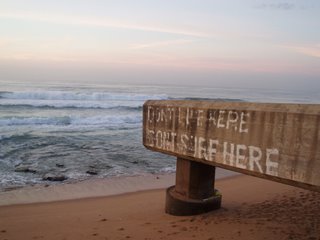
Now that I completed my first quarter at university yesterday (as in I finally handed in my final paper one hour after deadline, oops), the relief has been lifted off my shoulders and I can catch up on my sleep. Hopefully, second quarter will see that I prepare for my papers a little earlier so that I have more time for editing. It was a good paper writing bender despite the lack of exercise and sight of daylight.
My last paper was a study on Mozambique’s education policies as it relates to recent announcements of full debt cancellation by the International Monetary Fund (IMF), World Bank (WB) and the African Development Fund (AdF). The debt cancellation program is called the Multilateral Debt Relief Initiative and the three organizations have collectively selected … countries for eliminating their debt on yearly basis given that they maintain strict economic controls on their inflation, and budget deficits, prepare sustainable poverty reduction plans and a public expenditure management system. So for Mozambique, as of January 2006, the IMF and AdF wrote off $154 million USD of debt. This means that the funds formerly used for debt can go towards essential services such as the health care system and education. It is the breakthrough that organizations such as Make Poverty History and Jubilee South have all been campaigning for just this past year.
There are, of course, the disadvantages to this system. There is very little country or community consultation to many of the poverty plans and policies implemented in the country. The last word is always from the international institutions, mostly made up of representatives who have not been democratically elected. The whole meaning of democracy is lost when international powers can make decisions not determined by the people who are most affected. Secondly, governments must follow strict laws of an open market which does not allow countries to protect their own local industries. In the news, you’ll hear about industrialized countries that hold subsidies and tariffs on their own industries so that they can sell product to the global markets at below the commodity value. Where is the fairness when poor nations are forced to have no such government protection and try to compete with undercut prices from Canada, US, and Europe? In terms of education, there is the chance that IMF pressure will insist a more efficient management system without providing the resources for teachers and students to enhance their learning. On top of this, the government is working towards universal education for all. For example, teachers are unfairly evaluated for performance and paid accordingly when they are overworked (triple shifts), hold an average 60 children per class, poor classroom conditions, and very few teaching resources (textbooks, pencils, training, etc). Teachers forced to meet unreasonable demands with low wages undermines the quality of education. The promise of eliminating external debt will be one of the factors to eradicate poverty but even this can be impeded by conditions of international financial institutions.
Thursday, April 20, 2006
Medicine in South Africa
I have been feeling fairly ill since I came back from the Wild Coast and now starting to recover. This morning I took a nice stroll on the beach with the sun rising over the pink sky and blue ocean. It appears like the swell is setting in for the winter so it's time to find me a shorty wetsuit for surf. The knee is less swollen today and can also eliminate the limp from my walking. I wanted to point out the insane difference between generic medicine and brand name perscriptions. I had gone to a 24 pharmacist that asked whether I wanted the generic Cipro and I said of course. The price of the brand name was 3 times that of the generic medication. Ridiculous! It's also blows me away how generics in HIV/AIDs medication is so difficult to allow into South Africa even though a health crisis is happening right on the ground. Big Pharma has much strength to allow these drugs to come through to South Africa as much as it does to create barriers from its entrance. Afterall, once they allow one country to have ARVs (HIV medication) into the country with ease, then Big Pharma will also need let all the other countries be assisted from this deadly virus, and knock a bit off profits as it actually needs to compete (no more monopoly for you). Who would want this to happen...
Wednesday, April 19, 2006
Facing the Truth
Yesterday I attended a talk by Shannon Walsh from McGill University, Education, presented by the Centre for Civil Society. Shannon has been doing an ethnographic study on youth and the use of video. She used youth from Khayelitsha (township area) to develop a project about AIDS in their lives using the production of a documentary. She states that video was "transformed into a tool "for activist, pedagogical research and social change". She also saw the shift of power dynamics when conducting research. Instead of the orthodox foreign "privilege" researcher asking the questions, the students from an underprivileged area (township) were responsible in conducting the surveys in private elite high schools and township schools. It is a way of "researching up" or looking at research conducted by the actual participants. At the end she found the group gaining confidence and creating a documentary to share with their community. I wish Shannon all the luck with her research.
Tuesday, April 18, 2006
Umtentu, Transkei (Wild Coast), South Africa
Happy Easter to you all! I just came back from a trip in to an area in South Africa called the South Coast in the Eastern Cape called the Transkei. They call the Transkei the Wild Coast and its roads and remoteness proves to be just as wild as it states. On the Friday night, we stayed at a backpackers called Uma Valley Lodge. The lodge is run by Bernice, a woman with four dogs and a rustic, hippy type of hostel. The next day we left Port Edward, bought food at the local grocery store, then drove 3 1/2 hours through the unpaved roads to Umtentu. The drive is not for the faint at heart. The tracks ran up and down through the gorge's rocky and muddy trails. While you drive through the trails, you will find several empty soccer fields (soccer posts made with 3 wood sticks) and then schools powered by solar panels. The drive also had kids running out the the car yelling "sweets! sweets!" or pounding rocks in the large pot holes through the route. At the end of the drive you arrive at Umtentu and a lodge hiding in the bush overlooking the ocean, gorge and the marine-protected esturary. There was only the four of us and three hikers at the huts where we stayed. The next morning was beautiful and sunny so up the gorge we went on canoes. I have never paddled between two massive gorges before with the sound of baboons and kingfisher birds chirping away. Only downside was when I slammed my knee on the rock while I was jumping into the river to swim and the knee is bruised for the rest of the trip. I have some kind of bacteria that is making my stomach churn so I'm on the antibiotic Cipro to fend it off. Click on the photo to see a few other shots from the Transkei.
Monday, April 10, 2006
Typing away about Mozambique
Not the most exciting weekend as it was mainly composed of me sitting in front of my laptop either reading journal articles I had downloaded or highlighting photocopies from other pile of paper. I'm still trying to finish the first of my 20+ page papers on post-colonialism in Mozambique from 1975-1982. Why you ask? Well, I suppose if I want to work in the country I should probably understand a bit about its history. It would probably be a bit ethnocentric to just take my assumptions from a Lonely Planet guidebook. It's been an interesting read though and found out more about Africa than I knew. from 1956-1965, 32 African states had gained independence from European colonial powers. Some of those tried to adopt a socialist form of government where decision making was based on consensus and community. In Mozambique, however, historical causes such as ethnic conflict, separation by the Portuguese armies, hiding from forced labour, had made many people to live in dispersed 3-4 household groupings all throughout the country. So Mozambique had less of the typical village or community type structure than other African states.
This weekend had been mainly overcast. Apparently, this is how it feels when the autumn comes about. On Friday, I did go for a long walk on the beach passed this decrepit whaling station and collected 30+ kare shells on the beach. These are those smooth shells that people put on their hemp necklace. I couldn't believe how many were in front of me. Back to work...
This weekend had been mainly overcast. Apparently, this is how it feels when the autumn comes about. On Friday, I did go for a long walk on the beach passed this decrepit whaling station and collected 30+ kare shells on the beach. These are those smooth shells that people put on their hemp necklace. I couldn't believe how many were in front of me. Back to work...
Thursday, April 06, 2006
Ben Cashdan - White Gold
This week had a chance to view a short documentary called White Gold produced by Johannesburg's Ben Cashdan. This film was about the exploitation of the Lesotho Highlands and the dams being produced to provide water to cities in South Africa. It displays the project according to its devastating effects to the environment, the displacement of indigenous people and the benefits only filtering to the rich. The other issue is the poor maintenance of the water pipes leading to South Africa as they have leaks all the way down to the cities. He's got other great docs on water privatization and apartheid. See if you can get your hands on it.
Africa's development
Today was my last day of class for this first quarter and I am left with one week to complete my two essays. Today's class had an engaging debate about Africa's development and whether "concessionary" corporations will continue to help or impede the growth of this continent. Some tough questions were brought up on about the bargaining power of this transnational corporations and if nations can use their negotiating power to make sound decisions and partnerships with these companies and see the benefits reek to the people. In my opinion, it seems that this negotiating power has much to do with understanding the strategies of business and obtaining this information and knowledge. If Africa is looking to see a capitalist society with an African elite, then maybe investment should be placed in nurturing the business leaders who believe in this culture. However, once we see these business leaders become government, there is also a need to nurture an active civil society who will be willing to fight for democracy, accountability and transparency from the government and see the state act in the interests of better lifes for communities. But what can be done now while we watch our universities and technical schools create this base of educated individuals? Do you sit in the sidelines and watch business exploit opportunities of cheap labour and tax avoidance? I suppose it can come down to a socially responsible business as well as a socially responsible person. I suppose leaders can grow to understand their power to help others will have greater intrinsic values versus the power of profit. I'm still on the fence about that. But individuals can also become socially responsible by seeing their value as shareholders for some of these companies that supposedly are pressured by their shareholders to produce bigger dividends. Choosing to invest and use the services of socially responsible companies and encouraging others to do the same can be the start. If you like some street action, try to look further and show interest into why social movements and protests are increasing all around the world and gasp, participate in one yourself. Again, I've made it here to South Africa to not just sit on the sidelines but take a small step in a better direction, and you, as caring optimistic individuals, will also take strives to see the small changes you can make in your own lives.
Monday, April 03, 2006
The Weekend Move
Nothing to special to report for the weekend except that the move was successful and I'm very happy with the ceiling fan and clean tub in the new place. It's an interesting place with the landlady living in the basement of the house with her crazy white dog, her grandson living at the top of the house, and next door, another "granny flat" with some older woman. This type of housing complex seems to be very common all over the Bluff especially now that real estate & development is up 200% in South Africa. There is construction happening everywhere. I still have a small window view of the sea from my desk but otherwise my glass sliding doors face into the grassy patch that connects all three buildings. I had a small walk around the Bluff and found this elementary school with this gorgeous view of Durban and its industrial harbour. This morning I woke up at 6:30am and had a drive down to town at Addington beach (sandy break) and had some lovely rolling sets come with a beautiful sunny sky. Good way to start the morning.
Thursday, March 30, 2006
Celeste Designs in Mozambique
While I was living in Mozambique in 2004, I befriended a very talented Celeste, singer and clothing designer, who has just sent me a photo of one of her original designs. If interested, email: mbona_cambaza@yahoo.com.br.
Drakensburg pose
I just posted some photos online from the past two months here in South Africa. This is probably the only photo I have of myself since the rest of my batch are shots of animals, beaches, and waves. I have also been collecting some video of these places which will make for a nice travel video. Today, I am packing all my things up to move down the street to a new flat. I am also having a braii in front of Garvies to ring in the weekend. This weekend, I'll probably be working on my two papers on the Marxism, the Washington Consensus and Mozambique. Have a great weekend!
Monday, March 27, 2006
Time of the Writer 2006
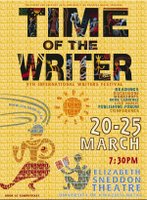
This was an international writer's festival that took place at my university last week March 20 to 25, 2006. I had the chance to attend the Wednesday evening talk on Writers crossing borders. This evening started off with Dennis Brutus from South Africa, an activist now working at the University of Pittsburgh. If you want to hear the most passionate speech about struggle of apartheid from one who was arrested and incarcerated on Robben Island with the likes of Nelson Mandela and Govan Mbeki (Thabo Mbeki's father), keep your eye out for Mr. Brutus. He spoke about South Africa today, where he sees the "elite transition" of a minority ruling over the country... once being white South Africans, now being a small group of black South Africans. His thoughts are provocative is bluntly looking at a government which may have ended South Africa's apartheid in the early 90s, but has also introduced a new "global apartheid" of banks and corporations through the IMF/WB pushing for the repayment of the apartheid regime's debt. These are banks in London and New York which are asking for repayment by the people of South Africa for a government that used the money to purchase arms and weapons to see the death of its people. When Mr. Brutus stood before the Supreme Court in New York a few weeks ago for the reparations for the victims of apartheid, the government of South Africa stood before the same court and refused this case to move forward. How does a government decide to deny its people the compensation from an atrocious past? Amazing speaker and makes you question whether those who have fought for the struggle have actually ended up selling out at the end.
The other two writers Abdelkader Benali from Netherlands/Morocco and Patrice Nganang from Cameroon spoke about their new books related to their images of their past. Benali's book is about a young Moroccan boy growing up in Holland and Nganang's book about a Cameroon pub from the eye's of a dog. Interersting stuff!
A Poverty of the Mind - NYTimes
There is a March 26, 2006 opted article in the New York Times by Orlando Patterson on his interpretation on why poverty exists in the United States particularly among African-American males. He believes that cultures evolve and that to an extent may have much to do with media's portrayal of successful stars and this pride and peer pressure that falls among this certain group. Check the article out.
Sunday, March 26, 2006
Drakensburg Waterfalls & Lesotho
Last night, I came back from a two day trip of an amazing view of another part of South Africa called the Drakensburg. It is this amazing range of mountains with a completely flat top and green covering all around the 'burg. The deep crevices show where there were once rivers flowing from the top and all the lines of sedimentary rock that layer up like a cake. Tomorrow, I'll upload the photos from the trip. We drove up through Sani Pass, which can only be taken with 4x4. Our friend, Max, just had his Jeep shipped out from the UK so up we went on this trek. At the top of the mountain part where we reached, you arrive at the border of Lesotho which consisted of a flock of mountain goat, some decrepit gate and a building that said "Customs" and inside were 5 men all hovering the small fireplace. Oh yes, it was very chilly at the top at 2870M and what is at the top of the mountain: the highest PUB in Southern Africa!!! excellent.
We stayed at the Sani Pass backpackers and pitched tents for the evening. There were loads of people from Belgium, Canada, South Africa, Austria and others at the place. Since we stayed in tents it only costs 45R. We had a braii (bbq) with morrocan flavoured chicken and lamb sausages. The next morning, went over to the Sani Pass Hotel and at the back of the hotel, is a 15 minute trail walk to this waterfall where you can abseil or swim under the water fall. After a nice morning picnic on the river, we drove 3 hours back home to Durban.
We stayed at the Sani Pass backpackers and pitched tents for the evening. There were loads of people from Belgium, Canada, South Africa, Austria and others at the place. Since we stayed in tents it only costs 45R. We had a braii (bbq) with morrocan flavoured chicken and lamb sausages. The next morning, went over to the Sani Pass Hotel and at the back of the hotel, is a 15 minute trail walk to this waterfall where you can abseil or swim under the water fall. After a nice morning picnic on the river, we drove 3 hours back home to Durban.
Wednesday, March 22, 2006
strange creatures...
I forgot to mention how my Human Rights Day went... well, uneventful as I type away at this opinion editorial that I need to hand in on Friday... until the afternoon. I went out surfing in the morning for about 30 minutes just because it was such a nice day and the sand banks have made it a very easy paddle out for my lazy surfing day. I went back to my reading of this book called "Looting Africa" by my professor Patrick Bond where it speaks about whether these white ribbon, celebrity campaigns have been a waste of valuable resources to more geniunely active social movements like the ones happening right here in South Africa. There are protests on the privatization of water as even in the South African constitution, it is the basic right for all citizens to have access to this natural source of life. With privitization, those who are not able to pay the high costs of water (large portion of one's salary for the poor) get their water disconnected or have alternatives like pre-paid meters (shuts off if can't pay), or installation of ventilated pit latrines or worst, shallow sewers where the thin pipes are designed so that the women must follow "Maintenance Procedures" of cleaning the clogged pipes from feces. What right to water? Water privatization is already not working as is the example of Argentina and Paris' Suez. The have been inadequate in providing the service of water to the people.
Okay, after some deep reading (1 hour), decided for a second surf at low tide and once out on the break, my body is feeling sharp but mild stings from something in the water. The other boys in the water said it was fireweed and that I should suck it up. Um. no, it's stinging all over my leg and arms! So I paddled back in after 15 minutes and jogged over to the KwikSpar for some lunch. In the evening, John and Candice, my neighbors were having a braii (BBQ) so though that I would join them for some boerwors (yummy sausages) and steaks. So, I'm holding out my half-bitten boerwors in a hot-dog bun when something hits my head and on to part my arm and bun. I look at my arm and it looks like a very long stickbug I could shake off, but oh no, it was a GECKO on my boerwors! I screamed and tried to shake it off with one big swing. John who is South African said that he had never seen a gecko jump off the wall for food before. insane and why me. I gave the rest of my bun to Dude.
Okay, after some deep reading (1 hour), decided for a second surf at low tide and once out on the break, my body is feeling sharp but mild stings from something in the water. The other boys in the water said it was fireweed and that I should suck it up. Um. no, it's stinging all over my leg and arms! So I paddled back in after 15 minutes and jogged over to the KwikSpar for some lunch. In the evening, John and Candice, my neighbors were having a braii (BBQ) so though that I would join them for some boerwors (yummy sausages) and steaks. So, I'm holding out my half-bitten boerwors in a hot-dog bun when something hits my head and on to part my arm and bun. I look at my arm and it looks like a very long stickbug I could shake off, but oh no, it was a GECKO on my boerwors! I screamed and tried to shake it off with one big swing. John who is South African said that he had never seen a gecko jump off the wall for food before. insane and why me. I gave the rest of my bun to Dude.
Strelitzia - Bird of Paradise



I thought that I would post a few things that have been a part of my life in the last few months. The Strelitzia or Bird of Paradise plants are the raddest exotic plants that I have ever seen (besides the hibiscus). So unusual in shape and not rare by any means in Durban. You see them everywhere yet I'm completely drawn by how exotic it is by shape and nature. (I'll try to post the photo if it didn't take so long to upload!). A new used bike so that I can cycle to the grocery store and back. Yessss... and Dude, this pooch that is in permanent retirement home at the Bluff. He is a great study buddy that sleeps on his mat and begs for food anytime he gets the change. I'll keep trying to load the photo but in the meanwhile, use your imagination. [update: looks like the upload works afterall!]
Monday, March 20, 2006
Corruption - what does it mean back home?
This is the latest article from Adbusters #64 comparing corruption in the same scale where one participates in it for their mere survival versus corruption in Quebec with the Liberals favouring their friends in the Gomery Scandal and other similar stories summed up in their article. So what does that mean for Canadians? Basically, tax money that was meant to be spent on Canadian nationalism campaigns had overpriced the estimate costs and the savings were pocketed to the contractors (friends) who supported the past government. It also means that smaller crimes of bribes in order to feed one's family of 6 should be considered twice before thinking about the bigger scale bribes happening in our own backyards.
Sunday, March 19, 2006
Studying all weekend...
Today, I have a 90 minute essay writing test where I need to prove that I have understood all theories up to now. I must have been in a daze when I initially read some of this material because second time looking at a few articles, I realized that I still have little comprehension of neo-Marxism and regulation theory, so I'm going to just give'r and see what piece of art comes out by 11am.
We had a visitor, Nicola, from Holland up for a few days at the house and now she is in Sodawana Bay doing some free diving. The rest of the weekend was spent a few hours surfing out front because there is a huge sandbank covering the reef. It makes it so much less scary when you know your wave pounding will not end up with scars. This Tuesday is a holiday; Human Rights Day, so I'll be propping the beach umbrella up as I try to suss out a good development economics editorial for submission for this Friday. Any ideas?
We had a visitor, Nicola, from Holland up for a few days at the house and now she is in Sodawana Bay doing some free diving. The rest of the weekend was spent a few hours surfing out front because there is a huge sandbank covering the reef. It makes it so much less scary when you know your wave pounding will not end up with scars. This Tuesday is a holiday; Human Rights Day, so I'll be propping the beach umbrella up as I try to suss out a good development economics editorial for submission for this Friday. Any ideas?
Friday, March 17, 2006
End of Development?
If I knew for a certainty that a man was coming to my house with a conscious design of doing me good, I should run for my life… for fear that I should get some of his good done to me. (Thoreau 1977 328)
This was the opening quote to Arturo Escobar’s article called Imagining a Post-Development Era. I really didn’t understand this quote until pulled into this context that it was the “First World” that invented this idea of the “under-developed” in the “Third World” and that in their deep industrialized beliefs, should come upon these developing countries and help them work towards being a “civilized society” and cure them from the ailments of poverty through their “development programmes”, aid organizations, and other expertise in the name of answer. It kind of reminded me of this story about Dan who invited some people into his house who wanted to talk about morality, spirituality and the way to the light… and he shut them down with his own arguments that didn’t see their return any time soon. It’s this self-imposing power relationship that undermines an individual’s abilities to decide their own fate. In the class, there was this discussion of the “voice for the voiceless” where one argued that it’s ridiculous to think that someone from the outside could come into a community and say they can relate and be an agent to say, an impoverished community and help them see the way to their survival. Another guy asked what was the problem with helping, say a mother with 23 kids who can’t go to a line-up that is 3 days long in order to request social services. I replied that it shouldn’t be our decision to make and that it should be decided by the woman herself when she is ready to speak up for her children and that the best we, as outsiders, can do is facilitate when the woman is ready to speak up for her rights. How can I be the judge that this woman is capable or incapable? That’s the idea of analysing the idea of social movements where people from the grassroots are deciding to take a hold of their lives and fight for their children’s right to a better life. I think it has to be local participation and locally owned establishments who understand their needs and the needs of their community under their own history, culture, language and beliefs can there be a change. It’s also this aspect of sustainability, loyalty, legacy, longevity, that makes localism seem more effective for development than say, the work of outside NGOs. Perhaps if it isn't social movements, perhaps someone else can look outside the box for any ideas besides "development". Then people can take Dan's lead and show development to door never to return.
This was the opening quote to Arturo Escobar’s article called Imagining a Post-Development Era. I really didn’t understand this quote until pulled into this context that it was the “First World” that invented this idea of the “under-developed” in the “Third World” and that in their deep industrialized beliefs, should come upon these developing countries and help them work towards being a “civilized society” and cure them from the ailments of poverty through their “development programmes”, aid organizations, and other expertise in the name of answer. It kind of reminded me of this story about Dan who invited some people into his house who wanted to talk about morality, spirituality and the way to the light… and he shut them down with his own arguments that didn’t see their return any time soon. It’s this self-imposing power relationship that undermines an individual’s abilities to decide their own fate. In the class, there was this discussion of the “voice for the voiceless” where one argued that it’s ridiculous to think that someone from the outside could come into a community and say they can relate and be an agent to say, an impoverished community and help them see the way to their survival. Another guy asked what was the problem with helping, say a mother with 23 kids who can’t go to a line-up that is 3 days long in order to request social services. I replied that it shouldn’t be our decision to make and that it should be decided by the woman herself when she is ready to speak up for her children and that the best we, as outsiders, can do is facilitate when the woman is ready to speak up for her rights. How can I be the judge that this woman is capable or incapable? That’s the idea of analysing the idea of social movements where people from the grassroots are deciding to take a hold of their lives and fight for their children’s right to a better life. I think it has to be local participation and locally owned establishments who understand their needs and the needs of their community under their own history, culture, language and beliefs can there be a change. It’s also this aspect of sustainability, loyalty, legacy, longevity, that makes localism seem more effective for development than say, the work of outside NGOs. Perhaps if it isn't social movements, perhaps someone else can look outside the box for any ideas besides "development". Then people can take Dan's lead and show development to door never to return.
Tuesday, March 14, 2006
Development as Freedom

Well, I finally have some webtime to spare! I've just been busy with school work as we come up to near half-way point of the 1st quarter so all of us are scrambling to submit our first assignments and prepare for the first test of the year. I just wrapped up two presentations (one on Smith's basic supply/demand concepts and another on the post-Washington Consensus) and a paper. Now I'm a few reading packages behind so I should get on that. Right now, we are covering post-development concepts with writers like Amartya Sen (Development as Freedom) where she states that development will take place only once people are provided with "substantive freedom in enriching human life". Freedoms include the ability to combat starvation, illiteracy, numeracy, and the ability to engage in polical life, enjoy economic resources, social programs, the sight of transparency and the provision of security.
Other things: South Africa had won the Cricket ODI series 3-2 to Australia with a record 438 in 49.5 overs. Apparently this is unheard of in the game of cricket and people have gone ape wild over this victory especially happening on their home turf. I haven't seen much of the rugby take place but I know our team is the Sharks and there are loads of crazy rugby fans noted by their apparel, stickers on cars, and continuous talk about the next game. Yea, I think I can grow to enjoy both sports.
It's starting to become autumn here in Durban. Hot weather by day and a bit of a chilly breeze by night. It's beautiful though with the purple skies lighting up beyond the clouds.
Thursday, March 09, 2006
Down to work
So, looks like I will be spending the weekend working on a 5 page paper and as some of my old roommates would know my habits of working on papers, I will probably be worrying about it all weekend while doing short stints of fun things but feeling completely guilty for doing fun things... then sleeping at 10pm Sunday night with papers all around by mattress to only have to wake up at around 3am Monday morning to hammer out the gist of an okay paper. So maybe I should wrap up the worrying and just do the paper this Friday and have the whole weekend free? Well, then it just wouldn't be the diga way. Have a great weekend.
by the way, I learned some Zulu phrases yesterday from an 11-year-old, Kersti. All I remember right now is Yebo! YES!! Let me know if you find any good Zulu learning websites so that I can hold conversations with random people at the bus stop or listen in on people saying, "man, that girl is crazy!" or "don't hit the monkey on the road". or "are these grapes washed?". okay.
by the way, I learned some Zulu phrases yesterday from an 11-year-old, Kersti. All I remember right now is Yebo! YES!! Let me know if you find any good Zulu learning websites so that I can hold conversations with random people at the bus stop or listen in on people saying, "man, that girl is crazy!" or "don't hit the monkey on the road". or "are these grapes washed?". okay.
Wednesday, March 08, 2006
Moving - to down the street
So goodbye to my ocean view beachfront home to just down the road in a smaller "granny flat" with a tiny ocean horizon site as they call it in S.A. The builders are full steam with renovations at the house where I am living, fully plastering and knocking out walls for new bathroom fixtures... this means I'll be hosting a huge moving away party on the 31st of March! My new place is $225 CAD per month with water/electricity included, has a small kitchen, small loungy area, bedroom, bathroom but I'm a little concerned whether there will be any appliances included (as in basic fridge, stove, etc.). We'll see at the end of the month. Good thing I can still walk down to the beach.
At the big house, we had Nontemba come in for half a day at R40 ($10 CAD) once a week to clean the rooms, bathroom, patio, and kitchen. Domestic workers are a commonplace to have at home as well as your gardener. I guess it would probably be a good idea to keep that job going for her since she will not be able to clean at the construction site and I'm not sure if she has other work or income going besides this.
At the big house, we had Nontemba come in for half a day at R40 ($10 CAD) once a week to clean the rooms, bathroom, patio, and kitchen. Domestic workers are a commonplace to have at home as well as your gardener. I guess it would probably be a good idea to keep that job going for her since she will not be able to clean at the construction site and I'm not sure if she has other work or income going besides this.
Tuesday, March 07, 2006
Today's Economics Seminar
Today was another enjoyable economics again reviewing the neo-classical economics, through the Great Depression then into ideas of today's world with a video presentation of John Pilger's "New Rulers of the World" from 2000. Pilger goes into Indonesia to investigate the underworld of sweatshop labour, the IMF's response (Stanley Fisher's quite defensive reply) to Suharto's regime and how the world was amazed by this Asian miracle which was in fact made up of authoritative bosses, corrupt and unaccountable, and the poor left in work camps with poor sanitation and no water access.
Stuff I'm reading: The Perverse Economy: The Impact of Markets on People and the Environment"
One of the speakers from the conference, Perelman describes how the market becomes unjust to people and the environment with applicable economic theory. From his opening remarks, I like how he drew upon the 18th century British aristocrats who were too lazy and unconcerned with the agricultural land that they ruled hundreds of kilometres away, were only brought out to the countryside during gaming season. Only then could the people speak to the landowner of their concerns. This de-motivated state and landowner's decision making based on little information led to Adam Smith's idea of the rule of markets and the demand and supply curves we all have seen in Econ 101. At the conference, he also related this 18th century case to South Africa apartheid.
If anyone is interested in access to the books that I mention on my blog, give me a shout by email.
Besides that, the weather has turned for the better so I've been out for runs in the afternoon at the beach, lots of back stretches, and by sunset watching the ghost crabs crawl out of their dugged up holes and scurry back into the ocean.
Stuff I'm reading: The Perverse Economy: The Impact of Markets on People and the Environment"
One of the speakers from the conference, Perelman describes how the market becomes unjust to people and the environment with applicable economic theory. From his opening remarks, I like how he drew upon the 18th century British aristocrats who were too lazy and unconcerned with the agricultural land that they ruled hundreds of kilometres away, were only brought out to the countryside during gaming season. Only then could the people speak to the landowner of their concerns. This de-motivated state and landowner's decision making based on little information led to Adam Smith's idea of the rule of markets and the demand and supply curves we all have seen in Econ 101. At the conference, he also related this 18th century case to South Africa apartheid.
If anyone is interested in access to the books that I mention on my blog, give me a shout by email.
Besides that, the weather has turned for the better so I've been out for runs in the afternoon at the beach, lots of back stretches, and by sunset watching the ghost crabs crawl out of their dugged up holes and scurry back into the ocean.
Sunday, March 05, 2006
Another beautiful weekend
Just a quick note before I head to a group meeting. Chilly weekend on the Bluff with lots of wind coming through the coast. I had to even pull out the sleeping bag to keep warm in the evening. I did more reading for class and Saturday evening found another side to Durban called Florida Road. My impression of Durban from my last visit was one of shops closing down at 5pm, everyone shutting down and heading home before dark. I went to meet some people from my class at a lounge place called Society on Saturday and there was this vibrant row of patio chairs filled with trendsters having dinner at 11:00pm or chatting over a latte... who would have thought!
I also thought that I would throw in a description of security at the university. It is not like a wide open campus where one can enter, student or non-student, into the grounds. You need to have a secured student card to swipe into the gates, then to get to the computer lab, you need to swipe again through a metal turnstile, very secure. If you want to get into the library, you must leave your bag in one of the lockers outside and you have only take your binders and pens. The university does not depict reality of the city or of South Africa at all. Here, it is very much a higher status place where only the select rich few can have the privilege to attend uni. Sure, there are a few students with refugee students or those on scholarships or bursaries from their goverments, but there are even more Einsteins out there who will not have the chance to reach their potential due to the reality of inequality. During apartheid, there was a university for Caucasian students, one for Indian students, one for Black students and I'm not sure where you would go if you do not fall under any of these classifications. They have definitely started to break through barriers by merging these campuses to one University of Kwazulu-Natal and not distinguishing schools by race.
Off shore winds (NW) made the waves look mighty fine this morning! Kathleen
I also thought that I would throw in a description of security at the university. It is not like a wide open campus where one can enter, student or non-student, into the grounds. You need to have a secured student card to swipe into the gates, then to get to the computer lab, you need to swipe again through a metal turnstile, very secure. If you want to get into the library, you must leave your bag in one of the lockers outside and you have only take your binders and pens. The university does not depict reality of the city or of South Africa at all. Here, it is very much a higher status place where only the select rich few can have the privilege to attend uni. Sure, there are a few students with refugee students or those on scholarships or bursaries from their goverments, but there are even more Einsteins out there who will not have the chance to reach their potential due to the reality of inequality. During apartheid, there was a university for Caucasian students, one for Indian students, one for Black students and I'm not sure where you would go if you do not fall under any of these classifications. They have definitely started to break through barriers by merging these campuses to one University of Kwazulu-Natal and not distinguishing schools by race.
Off shore winds (NW) made the waves look mighty fine this morning! Kathleen
Friday, March 03, 2006
Focus on the Global South

I also received this copy of "the Derailer's Guide to the WTO" published by a group called Focus on the Global South. There is a free download on their website as well. A woman at the conference showed a lovely propaganda-filled film named, "WTO: why is it REALLY BAD for you." Both items are informational on their sides of the recent Hong Kong Ministerial meeting in December. If you would like to see their side on anti-dumping and subsidized products from the west, feel free to check it out.
What I'm reading about in South Africa

Hein Marais, writer and journalist who works closely with the UN on HIV/AIDS, was supposed to speak at the conference this weekend but sent his regrets with a free copy of his new publication, "Buckling: The impact of AIDS in South Africa". You can download a free copy from the Centre for the Study of AIDS website based out of the University of Pretoria, South Africa.
Social Action
Here is attempt # 2 for this post... "better to die in battle rather than hold alot a very revolutionary and very pure banner and do nothing... try and make your revolution, go into combat, advance a little, in the right direction, instead of dreaming about utopias..." Hugo Chavez, President of Venezuela, Aug 2004. This conference week has resonated many messages of social action and movements most necessary in places still fighting for the rights of a social democracy. I can only believe that people do not back down to conformity and see a world slowly trickle back into history...
Thursday, March 02, 2006
Informal Markets
Yesterday was South Africa's municipal elections with the African National Congress most likely to gain most support across the country.
Other news: at the conference, Caroline Skinner was speaking about the informal economy and how the current government believes that this sector contributes very little to the national GDP. Caroline refutes the case that the informal sector contributes substantially to national budget particularly because most of it is unreported work (domestic work, contract factory workers, small fruit stalls). One attendee also brought up a very important point even applicable to home. She said that the socio-economic security of this unreported work is hurt because if the government chooses not to recognize or identify this work, they do not feel responsible to provide public services to these individuals. Even in North America, there is a trend of more contract work and part-time work to unskilled and even semi-skilled workers because again, the choice for employers wishing to cut costs for profit and thereby not passing on the basic services of healthcare and worker's compensation to their workers.
Other news: at the conference, Caroline Skinner was speaking about the informal economy and how the current government believes that this sector contributes very little to the national GDP. Caroline refutes the case that the informal sector contributes substantially to national budget particularly because most of it is unreported work (domestic work, contract factory workers, small fruit stalls). One attendee also brought up a very important point even applicable to home. She said that the socio-economic security of this unreported work is hurt because if the government chooses not to recognize or identify this work, they do not feel responsible to provide public services to these individuals. Even in North America, there is a trend of more contract work and part-time work to unskilled and even semi-skilled workers because again, the choice for employers wishing to cut costs for profit and thereby not passing on the basic services of healthcare and worker's compensation to their workers.
Tuesday, February 28, 2006
Speakers Day 1
Today was day one of the Colloquium on Economy, Society and Nature here at UKZN. There are several South African known speakers speaking on South African labour markets, race, development and state and other related topics. This morning we heard from Ann-Marie Wolpe whose late husband, Harold Wolpe, was known here in South Africa with assisting Nelson Mandela out of apartheid through the MK (spear of the people)and Lilyleaf. Another speaker, Ari Sitas, in Sociology at UKZN spoke about there needing to be a "steering mechanism" where social action must take place before this trend of South African authoritarism or crisis begins to take hold and the "democratic form of state will miss out in the balance of equality and freedom" (Ari Sitas). A clear example of this was yesterday, shanti dwellers were beaten by police during a peaceful protest here around Durban for property rights and reform. More interesting stuff to come.
Sunday, February 26, 2006
Myrdal's Theory of Development
I did a bit of catch up reading this weekend (besides picking avocados and spotting the tails of whale sharks from the beach) where I came upon this Swedish economist named Gunnar Myrdal. He started to change the way of thinking of economics to include factors not dealing solely on markets but as well with non-economic factors of welfare, and standards of living. He came up with conditions that can either move a country either forward or backward depending on investment on resources for industrialization, distribution of income and land reform, and promotion of social equality. He used his studies to prove that a nation cannot grow without the elimination of poverty and inequality. We may think that this is obvious now but he started this movement of thinking with his publication Asian Drama and his works to follow. He also argued that people should not accept an inevitability of inequality because it is morally unacceptable but also that it is causally not true.
Thursday, February 23, 2006
Microfinance Speaker Series: Canadian Universities
If you or your friends wanted to know what type of Microfinance work I am interested in, the Aga Khan Foundation is hosting this tour on Microfinance at universities across Canada. If you are in Vancouver, check it out at UBC under:
The Role of Microfinance in International Development: Unleashing Opportunities for the Poor, will feature speakers from Pakistan and Egypt.
Thursday, March 23rd, 2006
5:30 - 8:30pm
Multipurpose Room, Liu Institute for Global Issues
6476 NW Marine Drive
Vancouver, British Columbia
If you are not in Vancouver, you can check the website for other locations and dates.
The Role of Microfinance in International Development: Unleashing Opportunities for the Poor, will feature speakers from Pakistan and Egypt.
Thursday, March 23rd, 2006
5:30 - 8:30pm
Multipurpose Room, Liu Institute for Global Issues
6476 NW Marine Drive
Vancouver, British Columbia
If you are not in Vancouver, you can check the website for other locations and dates.
The Power of Telenovelas
Well, first week is over and I am already falling behind on assigned readings and preparing for upcoming presentations. Talk about throwing you right into the lion's den. I'll have to get the balance right with beach and school time. Another really interesting student I met at the international student office - Annette. She comes from Uganda and she is doing her Masters in Communications and Mass Media. Previous to coming to S.A., she had worked for a public relations firm in the capital. Her studies will be in using media for public health messages. When I was living in Mozambique, I heard that this method of social marketing was very successful in Brazil with their telenovelas in advising the public about HIV/AIDS and other public health messages. I also heard that Brazil intergrates some powerful messages in the lyrics of some popular music.
P1010028
Here are some of my photos from the recent trip to St. Lucia game reserve on the East Coast of Kwazulu-Natal Africa. These rhinos came right up to our vehicle with the pointy horns. Could have been a close one if they didn't become occupied with other priorities. Click on the link for a few more photos.
Economics: 'What is, will not be'
Just had the most insane Economics seminar yesterday. It was just the dumb-strucked lesson I needed to hear about the world and its evolution of thought in development and economics. It's a dynamic and exciting place to be and the school makes me confident to believe that there is a future or "professionalization" in this discipline. For example, the World Bank announced in the 2006 World Development Report that equity was needed in order to enhance the power of efficiency and growth - this is the first statement of its kind to appear in such publications. These type of statements display a movement towards considerations of human capital and politics when addressing a once rigid look at economics at a solely competitive market standpoint. As well the recent Havard president resignation of Lawrence Summers show that even professionals in economics can make the most ridiculous claims on women in science and solutions to environment. Next week, the Centre for Civil Society in our department will be hosting a COLLOQUIUM ON ECONOMY SOCIETY & NATURE which will be hosting some renowned South African economists and development people. Should make for an exciting week!
Monday, February 20, 2006
Quick message to you

I have started classes finally! Today was on Comparative Development and its Problems. Basically it was a debate if the classification of 1st, 2nd, and 3rd World is obsolete in our present society. What I am reading: Reclaiming Development by Ha-Joon Chang and Irene Grabel. Some contemporary policy issues to development. What else; surfed some small waves at Garvies and learning to drive standard! clutch, 1st, accelerate...digs
Friday, February 17, 2006
Jean from the Congo
As part of my goals to further my interest in the development field, it is to meet interesting people who have done work in developing countries and get their perspectives on change. Today at a small class picnic, i met Jean from the Congo. Super interesting guy who has worked as a Program Director for an NGO, National Union of Women with connections with UNDP, in Djibouti. He went to talk about how his program involved gender related issues such as teaching women Arabic, learning to sew, agricultural initiatives. He even worked closely with the First Lady of the country as she led this National initiative. His greatest accomplishment though in the program was working with the community to end female mutilation. It took close to 3 years to convince the imam (Djibouti is a Muslim country) that this practice is not representative in the Koran and find alternative employment to those women who once performed this unsanitary, painful operation to work in midwifery. I'll have to say that 3 years is amazing to accomplish such a feat and hats off to anyone that has kept another female from this abuse.
Thursday, February 16, 2006
Natal Sharks Board - St. Lucia

Apparently the strike is over at University of Kwazulu-Natal but I haven't noticed since I took off North-East with the Natal Sharks Board to St. Lucia Marine Reserve. A friend of mine, Sean, had been invited to go with Devin and Jeremy from the Sharks Board to assist with tagging sharks up near Sodawana and Raggies Reef and asked if I wanted to come along. We left Tuesday afternoon and drove 2 1/2 hours north to a tourist town of St. Lucia to pick up some provisions then continued North through the game reserve and into Cape Vidal to stay at one of the log cabins. It was so humid and hot, at least 30 degrees and the electricity had been down. We decided to do a bit of a drive through the game reserve and spotted rhinos, waterbuck, kudu, wart hogs, ZEBRAS! It was getting dark so we wrapped up with a mincemeat dinner and off to bed. The divers got up by 4:30am the next morning to prepare the boat while I slepped in until 7:45am and had a small breakfast before hitting the white sand beach. On my walk, I spotted several monkeys and this other fawn watching me. The water was crystal blue, a few waves behind the reefs. It was a fairly empty beach until 10:30am when all these school kids came running onto the beach. The Sharks Board boat came back by 12:30pm for lunch. They had a successful trip and saw about 20+ ragged tooth sharks circling their one of the listening stations they were monitoring. After we cleaned up, we cruised through the game reserve down to the estuary where there were hippos and crocodiles milling around the sea. One thing I noticed were loads of burned stumps throughout the game reserve. These were foreign trees that had been planted here a long time ago. Unfortunately, the trees had been sucking the grasslands dry and in order to bring the reserve back to its natural state, they have unending fields of burned stumps. Hopefully in 20 years the grasslands will once again be the sanctuary it once was.
Monday, February 13, 2006
Riley, the deaf pointer
Here are one of the beach pups that come and visit the house where I am staying. You can communicate by sign language with her and she loves shell games and playing with shadows and light. I will post information on my first day of classes (which didn't happen) as soon as I get better web access. A cool thing: at the beach, saw some kind women drive up in a car in the lot and break out food for all the street kids. Kathleen
Friday, February 10, 2006
Week One: Check!


Soooooo... the first photo is the view from my place on the Bluff. Second photo is the law building on Howard Campus. So first week of Orientation is done and I'm about as lost as Waldo. Just as Waldo, I'd tip my toque, straighten the glasses and continue to walk around with a smile on Howard campus. Yes, I got lost trying to find my way home. Yes, the strike has kept me from registering for any classes, getting a student for the purpose of use of the internet in the labs and other academic things (library. ha). The administrator at the School of Development Studies is sympathic to the internationals since we are the majority and has been in and out the office assisting with course materials, answering questions. Other business, I went out for my first surf yesterday in the town. Small 3 metres, super gentle, on a nice sandy bank... I need to ease into the surf again considering my last month in Vancouver consisted of very little exercise. Trying out this 7'4 mini-mal a bit heavier than Stewart board back home. Another surf this afternoon, another westerly blowing so should make for some nice off shore waves again on the south coast. Have a good weekend and talk to you all soon.
Wednesday, February 08, 2006
Arrival in Durban
Finally arrived in South Africa after a 7 hour flight to Dakar, 1 hour fuel stopover, then 8 hour flight to Jo-berg, followed by a stroll through the international arrivals to domestic departures with my 28 kg suitcase and backpack. I was picked up and staying over at a house in the Bluff facing the beach. Huge 5 footers rolling though after the storm and will take photos as soon as I get my Apple set up. I started a Writing Skills class today and met about 20+ classmates for my Masters... yeah, only 2 of them are actually South African. Some from Kenya, US, Ethiopia, Norway... just what I was looking for. Ask for the class, I think the main point I got out of it is to keep writing and ideas will flow. Don't be closed off by a structure or narrow path as you might miss some of the best ideas doing the alternative. Thank you for all your emails and I will do my best to write back once I get real online access. By the way, the school is on strike. fancy that. ha.
Sunday, February 05, 2006
New Yorkers...


What a fabulous time in New York! I arrived on Friday evening awaiting Barinder and Param at the JFK airport, took a cab in to Manhattan and there was Terri all stoked on the city. We took in the sights: Times Square, dinner at one of the hundreds of delis, Madison Square Garden, just strolled around the city until 4:30am! B & P had been to New York City before so they had a good idea of the area, subway use and references to every TV show or movie there is in New York. The next morning, we rolled over to Greenwich village for some brunch at a wicked egger and margarita spot. We passed through NYU and then Soho for some shopping. Then back to the Paramount Hotel for a bit of a rester before dinner in the Meatpacking District at an italian spot called Vento. To follow a hardy carb meal was all night dancing at Aere. Something to remember when moving around is to love your locals and your concierge; they can be the most wonderful helpful people in a fast-paced city like New York. Chris gave us full VIP access straight into the bar (that usually costs $20 a person) and you should have seen the look of some of those lined up. If we only had a camera at the entrance. Then all night djing that I had been dying to hear for my whole life. All I could say is that the legs could not say no! Finally we rolled out of that club and cabbed back to the hotel by 5am. The next morning, Terri and I took the trip up to the Empire State Building with the most incredible view of this concrete jungle. Then back on to the subway to head to the airport for my 17 hour flight. Thank you Terri, Barinder and Param for a great start to my journey, I couldn't have asked for more...
Friday, February 03, 2006
Off to South Africa
After months of school preparation and non-commitment to this blog, I am opening up the flood gates of 2006 with new and exciting stories from South Africa starting next week. I noticed that as the day gets closer, people are getting excited around me for the trip yet I remain nervous and calm... I think it might be partly due to the unpredictability of whether I will actually get fully engaged and interested in the content of my studies, or if it will become a surf trip of a lifetime. I wish for both. To those I will see in New York this weekend, can't wait! To those I leave behind, you are doorsteps away from Durban. See you soon.
luv Kathleen
luv Kathleen
Tuesday, October 25, 2005
People of Change
This last week, there have been several leading individuals who have sparked the movement for change or have influenced others to take up the fight for rights. Whether it be by civil disobedience or going against the grain of reality, they are moving people to see that there is hope for change.
Rosa Park: She was the tipping factor for civil right movements to take place in the US. She refused to give up her seat on a city bus in Montgomery, Alabama, and was fined for this act. In response, leaders such as Martin Luther King Jr. took up the cause to change the law in the US.
Stephen Lewis: He seems to be the buzz with the new release of his book, Race Against Time, as the UN Special Envoy to Africa on AIDS. He has been doing a cross country Canada tour through the Massey Lecture series. If you miss one of his presentations, you can also hear it through the CBC in November.
Mukhtar Mai: A Pakistani from Meerwala speaks up on violence against women. After defending her brother at trial for the honour of her family, the tribal council sentenced her to gang rape. She decided to take her case to higher courts and a flurry of media picked up on the story, well-publicizing the unfair treatment of women. She was compensated for some of her suffering and put the money towards building the first two schools in Meerwala.
Rosa Park: She was the tipping factor for civil right movements to take place in the US. She refused to give up her seat on a city bus in Montgomery, Alabama, and was fined for this act. In response, leaders such as Martin Luther King Jr. took up the cause to change the law in the US.
Stephen Lewis: He seems to be the buzz with the new release of his book, Race Against Time, as the UN Special Envoy to Africa on AIDS. He has been doing a cross country Canada tour through the Massey Lecture series. If you miss one of his presentations, you can also hear it through the CBC in November.
Mukhtar Mai: A Pakistani from Meerwala speaks up on violence against women. After defending her brother at trial for the honour of her family, the tribal council sentenced her to gang rape. She decided to take her case to higher courts and a flurry of media picked up on the story, well-publicizing the unfair treatment of women. She was compensated for some of her suffering and put the money towards building the first two schools in Meerwala.
Thursday, October 20, 2005
New Design, new content - Welcome back!
I've chosen a new template design but still driving for the same content. This website will continue to showcase how it is the small things that make a profound difference whether it be in your own life or the lives of others. In the next few days, I'd like to display some of the photos I took during my 3 week visit in the Philippines, education weblinks to programmes in international development and more interesting articles on trade and the world around us. Thanks for sticking it out with me and I'm stoked for the next few days...
Saturday, October 01, 2005
Website Revamp
I apologize to my readers for lacking in the content this last month. I am currently in the process of giving my site a design change so bear with me. Lots more good stories and photos to share. Changes should begin this month. Thanks for your understanding and patience.
Tuesday, August 16, 2005
A thoughtful pause
I am at the airport right now on my way to the Philippines. Unfortunately, my grandfather passed away this week and decided that it was time to see this side of my family. The last time I was in this area was when I was 7 years old. Coincidence or not: my new passport arrives early morning the day I am about to leave. I hope to return with incredible stories of renewal and change. Thank you to everyone who has sent me their kind words and thoughts. You are also in my heart.
digs
digs
Friday, August 12, 2005
Showcase: CARE
I thought this might be a good idea to showcase some of the international NGOs out there in hopes that you become familiar with some these organization's goals and objectives and decide for yourself whether their cause meet your own values and hopes for a better place to live. It does not necessarily mean that I support their work but it's a good start for learning about their work abroad either in aid or economic development. CARE International has been around since 1946 and service over 70 developing countries. There are 12 member countries in CARE each of which implement their own projects (own funding) in agriculture, income generation initiatives, emergency, health, etc. I guess CARE caught my eye in their regular advertisement in the business section: Tools for Development (http://care.ca/make_a_dif/tls/tls_e.shtm). They are gathering new and used equipment from people and industry to provide to micro-businesses abroad. Interesting concept if they are able to figure low shipping costs and good criteria as to whom these tools may be given.
Wednesday, August 10, 2005
Developments

It's been a while since my last post since I have been trying to put together some application letters for grad school and some overseas positions. The Canadian Society for International Health have some job postings for mainly young technology-based consultants for Ethiopia, Vietnam, the Phillipines and South Africa. I have also started to compile some good websites to pursue for other internships and scholarships for work abroad.
I recently received this publication, developments, the international development magazine, in the mail. I am not sure when or what I signed up for in the recent months but the UK's DFID funds this collection of articles and news about projects (mainly DFID-funded) happening around the world. This particular edition emphasized stories about Ethiopia and its thriving history and it's attempt to move away from the stereotypical image of the starving and famine. There are a few words from Bob Geldof on his perspective of changing the minds of our leaders to aid increase, debt cancellation and trade justice.
Another free publication is "The Rough Guide to a Better World", a short guidebook to "how the world can be a better place for everyone".
Thursday, August 04, 2005
Niger and the Free Market
The Globe and Mail had an article yesterday on how the government and the UN held back distributing food to those vulnerable from the famine because they believed that the free market would naturally work to feed the community. Unfortunately, these institutions must have forgotten the whole concept of supply and demand as demand increases with limited supply of food, the price rises. The price of food in Niger has increased enough that few disadvantaged people are able to afford a small meal for their child while the food stalls next door remain abundant with food. After the recent worldly publicized famine, finally food was subsidized or distributed. Allowing markets to run steady the path of business is possible but perhaps not in the case of emergency relief.
Updated: Aug 6: New vivid images of the poverty in Niger from the New York Times.
Updated: Aug 6: New vivid images of the poverty in Niger from the New York Times.
Wednesday, August 03, 2005
Canadians Make a Difference
Interested in seeing what Canadians are doing abroad? Check out the short stories on CIDA sponsored individuals who decided to go out and learn more about the world around them.
 The .Canadian International Development Research Centre also awards young Canadians for research.
The .Canadian International Development Research Centre also awards young Canadians for research.
 The .Canadian International Development Research Centre also awards young Canadians for research.
The .Canadian International Development Research Centre also awards young Canadians for research.
Subscribe to:
Posts (Atom)
